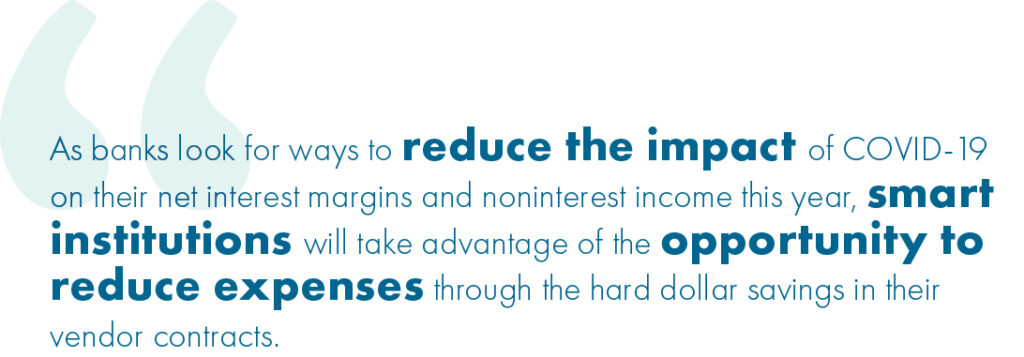By Nick Lane, Director, Cornerstone Advisors
In the wake of the COVID-19 pandemic, financial institutions can quickly realize savings by renegotiating major vendor contracts.
Earnings rank high on the list of challenges banking executives are facing as they adapt to the “new normal” of COVID-19. While most Americans have been functioning under nearly two months of stay-at-home orders, banks have been operating under business continuity plans, limiting branch traffic to drive-thru and by appointment only, managing increased customer needs and, for those participating, dealing with the demands of the Paycheck Protection Program (PPP).
As banking leaders look for ways to cut costs to minimize the impact of interest margin and noninterest income compression, vendor contracts should be in the crosshairs.
Renegotiating major vendor contracts can quickly generate hard-dollar cost savings for financial institutions.
From a financial perspective, interest margins and consumer spending are two areas where banks are going to feel the biggest impact of COVID-19:
- Interest margins will compress. While homeowners are refinancing to take advantage of historically low rates, the demand for new mortgages, consumer loans and auto loans, coupled with the slowing in new commercial real estate loans, will put a drag on loan production. Financial institutions participating in PPP are working day and night, handling applications for loans that pay a fixed rate of 1%.
- Consumer spend has reduced. The average bank generates 30% of its noninterest income from interchange. Meanwhile, card volumes have declined 15%-20%. Grocery and online spend have increased compared to other interchange categories, but these categories are traditionally on the lower end of interchange rates.
Core vendors are also facing challenges:
- New technology is taking a back seat. Interest in new technology always wanes during economic downturns as businesses pivot to operational efficiency.
- Payments revenue has declined. The dramatic drop in consumer spending translates to a significant impact on revenue from payments processing. The Big 3 core vendors are just as much payments processors as they are core vendors. On average, they generate 40% of their revenues from payments.
The word in the Cornerstone client trenches is that vendors are taking steps to proactively offset the pandemic’s impact on their bottom lines. We’ve been told that sales agents are dismissing requests for three-and five-year term options in favor of seven-, eight- or even 10-year terms. By all indications, sales agents are being told to get out there and extend term.
In addition, we are hearing that vendor reps are engaging with customers well within the current term rather than the typical 12 to 18-month lead time on contract expiration dates. The goal is to renew early and extend term. At Cornerstone, we call this an “unsolicited bid.” It’s not just happening with the vendors’ larger clients. An institution with less than $100 million in assets and three years left on its contract recently shared how its vendor (one of the Big 3) gave the institution a renewal proposal to add four years to the term.

These types of activities will allow vendors to report to the Street that, while new business growth is taking a hit, service contracts are up overall. Because markets are forward-looking, if vendors report contract extensions as positive forward guidance, it can have a positive impact on their share price. That’s it in a nutshell: increased share price for vendors and less flexibility with longer terms for their clients. That is, if their clients let it happen.
Knowing the vendors’ needs and priorities gives banks additional leverage to negotiate favorable renewals. Here are five tips for making the most of the opportunity:
- Don’t let contracts auto-renew
Amid COVID-19, FIs are inundated with additional responsibilities. For example, renegotiating a card processing contract could easily drop down on an institution’s list of priorities, making auto-renewal the default course of action. Banks should recognize that even if the vendor hasn’t reached out to discuss a renewal, now can be an opportune time to think proactively about reducing noninterest expense through renegotiated contracts. That being said, from a strategic standpoint, an embedded one-year auto-renewal clause in a contract can provide an institution with the flexibility it will need if it is considering a replacement of the service. - Consider starting early
Depending on the system, the sweet spot to begin negotiations under normal circumstances is 18 to 24 months prior to expiration. But these are not normal times, so it may be appropriate to start sooner, whether or not the vendor has contacted the institution. This is particularly true for an organization that needs to boost its remote delivery capabilities. Cost savings on existing products can fund investments in new products. - Be wary of unsolicited bids
A 10%-20% reduction in fees might sound good, but it’s not a deal for an institution that is already paying 40% above market. An unsolicited bid is a clear signal that the institution is paying too much and the vendor needs to book the extension as revenue. This is the time to get pricing down to market — and not what the vendor says is market. - Don’t agree to more term than is comfortable
While a seven-year (or longer) term may make sense in certain scenarios, these are the exceptions. Given the pace of change in technology, the ever-evolving vendor marketplace, internal growth and annual price escalators, a five-year contract is typically the sweet spot where an institution can achieve significant savings while maintaining a degree of flexibility. Rest assured — vendors want the business no matter what the term length is. - Get outside help
Banking executives are busier than usual and are likely to stay so for the foreseeable future. Reputable third-party professionals can provide authoritative access to market knowledge and do all the heavy lifting.
As banks look for ways to reduce the impact of COVID-19 on their net interest margins and noninterest income this year, smart institutions will take advantage of the opportunity to reduce expenses through the hard dollar savings in their vendor contracts.
By Nick Lane, Director, Cornerstone Advisors
This story appears in Issue 4 2020 of The Kansas Banker Magazine.









